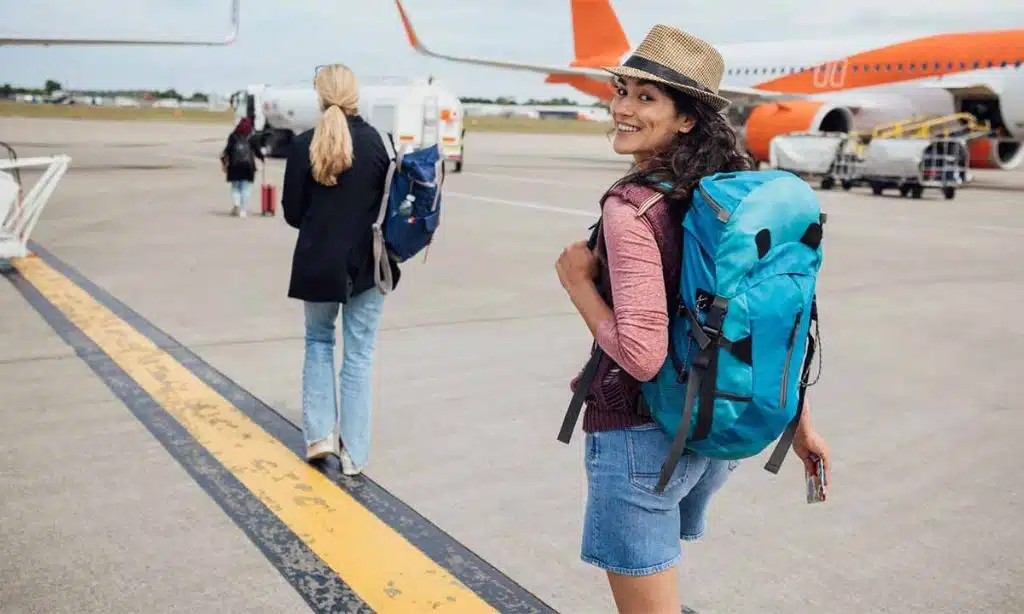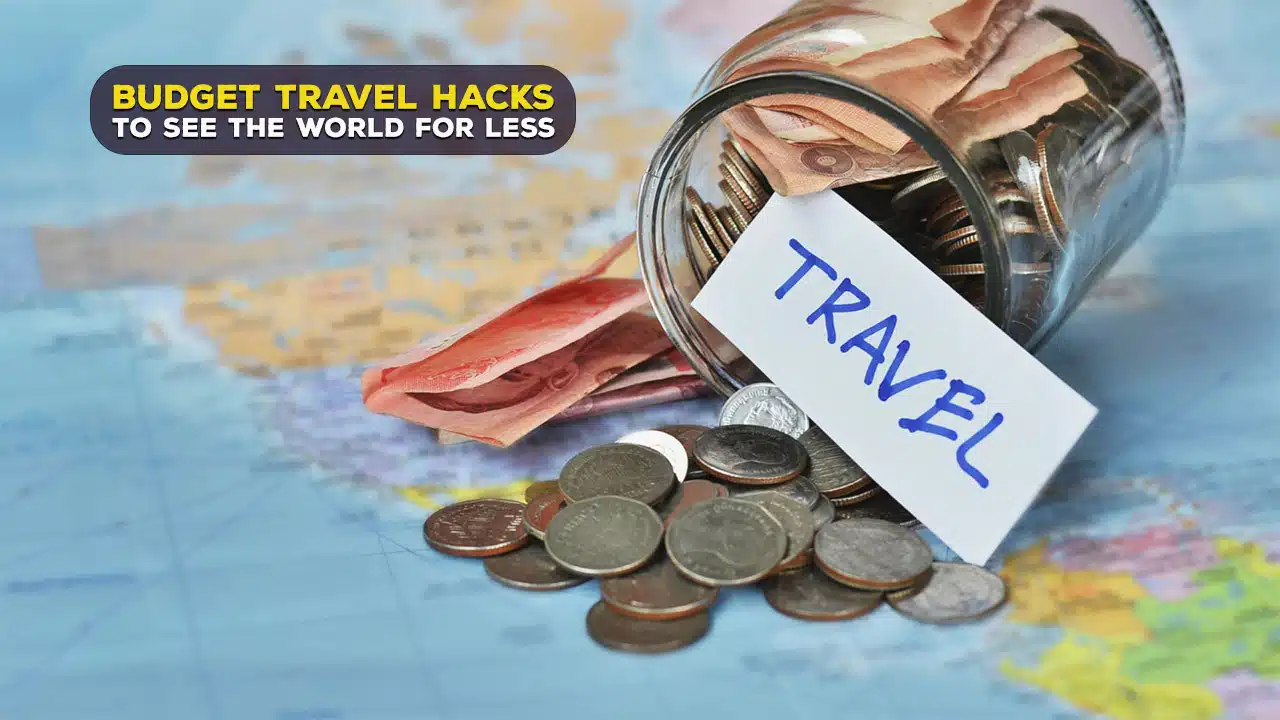Have you ever scrolled through Instagram, marveling at stunning travel photos and thinking, “I wish I could afford to travel like that”? Well, get ready to turn those daydreams into reality! Traveling the world doesn’t have to drain your bank account. With a bit of know-how and some insider tips, you can explore exotic beaches, wander through ancient ruins, and immerse yourself in vibrant cultures without breaking the bank.
In this comprehensive guide, we’ll uncover 20 budget travel hacks that will revolutionize the way you see the world. Whether you’re a college student on a shoestring budget, a family looking to stretch your vacation dollars, or a retiree wanting to make the most of your golden years, these tips will help you travel further, stay longer, and experience more for less. Let’s dive into the world of budget travel. Your next adventure is closer than you think!
1. Be Flexible with Your Travel Dates
One of the easiest ways to save big on your travels is to be flexible with your dates. Airlines and hotels often change their prices based on demand, so being able to shift your travel days can lead to significant savings.
I once saved over $300 on a flight to Japan simply by moving my trip by two days. I had originally planned to fly out on a Saturday, but when I checked the prices for the surrounding dates, I found that a Monday departure was significantly cheaper. This simple change allowed me to extend my stay and enjoy two extra days of exploring Tokyo’s vibrant neighborhoods.
Tips for flexible travel dates:
- Use flight search engines with flexible date options
- Consider traveling during shoulder season
- Opt for weekday travel when possible
- Be open to traveling during off-peak hours
2. Sign Up for Travel Reward Credit Cards

My first big international trip was largely funded by credit card rewards. By strategically using a travel rewards card for my everyday purchases over a year, I accumulated enough points for a round-trip flight to Europe and several nights in hotels. It felt like I was traveling for free!
Tips for maximizing travel rewards:
- Look for cards with significant sign-up bonuses
- Choose cards with no foreign transaction fees
- Consider cards that offer travel insurance benefits
- Opt for cards that earn points on everyday spending
- Research cards that offer annual travel credits
3. Use Budget Airlines for Short Flights
For shorter trips, budget airlines can offer incredible savings. While they may not provide all the frills of full-service carriers, they can get you to your destination for a fraction of the price.
During a summer backpacking trip through Europe, I relied heavily on budget airlines to hop between countries. A flight from London to Berlin cost me less than $30, which was cheaper than taking the train and saved me an entire day of travel time. This allowed me to see more countries within my limited budget and timeframe.
Tips for using budget airlines:
- Research budget airlines operating in your region
- Be aware of additional fees for baggage and seat selection
- Pack light to avoid baggage fees
- Be prepared for less legroom and fewer amenities
- Check the airport location, as some budget airlines use secondary airports
4. Stay in Hostels or Guesthouses
Accommodation often eats up a large portion of travel budgets. Hostels and guesthouses offer budget-friendly alternatives to traditional hotels, often with added social benefits.
My first hostel experience was in Barcelona, and it completely changed how I travel. Not only was it affordable, but I also met fellow travelers from around the world. We ended up exploring the city together, sharing tips, and even planning future trips. The money I saved on accommodation allowed me to extend my stay and truly immerse myself in the vibrant Spanish culture.
Tips for hostel and guesthouse stays:
- Consider dorm-style rooms for maximum savings
- Look for hostels with private rooms if you prefer more privacy
- Take advantage of hostel amenities like shared kitchens
- Choose hostels with good social areas to meet other travelers
- Read reviews carefully, focusing on cleanliness and safety
- Consider guesthouses for a more local experience
5. Try House Sitting or Home Exchanges
For longer stays or a more homey experience, house sitting and home exchanges can provide free accommodation while offering a unique local perspective.
Last year, I spent a month in Melbourne without paying a cent for accommodation. I used a house sitting website to connect with a family who needed someone to watch their home and cat while they were on vacation. Not only did I save a fortune on hotels, but I also got to live like a local in a charming suburban neighborhood, complete with a friendly feline companion!
Tips for house sitting and home exchanges:
- Sign up for reputable house sitting and home exchange websites
- Create a detailed profile highlighting your experience and reliability
- Be prepared to care for pets in many house sitting situations
- Look for opportunities well in advance of your travel dates
- Be flexible with your destinations to find more opportunities
- Communicate clearly with homeowners about expectations and responsibilities
6. Cook Your Own Meals
Eating out for every meal can quickly deplete your travel budget. Cooking your own meals, even occasionally, can lead to significant savings.
During a two-week trip to Italy, I balanced my pasta cravings with budget-friendly home cooking. I stayed in an Airbnb with a kitchen and visited local markets to buy fresh ingredients. Not only did I save money, but shopping for groceries and cooking Italian dishes became a cultural experience in itself. Plus, the money I saved allowed me to splurge on a few unforgettable restaurant meals.
Tips for cooking while traveling:
- Stay in accommodations with kitchen access
- Shop at local markets and grocery stores for fresh, affordable ingredients
- Pack a portable water filter to save on bottled water
- Bring some basic portable cooking tools if you plan to cook often
- Plan picnics for lunch to enjoy scenic spots while saving money
- Balance cooking with trying local cuisine to fully experience the culture
7. Use Public Transportation

In Tokyo, I initially felt overwhelmed by the complex metro system. However, after purchasing a week-long unlimited pass and spending some time learning the routes, I was zipping around the city like a pro. Not only did I save a fortune compared to taxis, but I also got to observe local life and discover hidden neighborhoods I might have missed otherwise.
Tips for using public transportation:
- Research public transportation options before you arrive
- Look for multi-day transit passes for better value
- Consider city tourist cards that combine transport and attraction entry
- Use buses for longer distances between cities
- Don’t overlook local trains for scenic and cost-effective travel
- Be aware of peak hours to avoid crowds
8. Walk or Bike When Possible
For shorter distances, walking or biking can be the most budget-friendly (and healthy) option. Many cities are becoming increasingly pedestrian and bike-friendly, making this a viable option for travelers.
One of my favorite travel memories is from Amsterdam, where I rented a bike for my entire stay. I cycled along picturesque canals, through beautiful parks, and even to neighboring towns. Not only did I save money on transportation, but I also got to experience the city’s famous bike culture firsthand and stumbled upon charming cafes and shops I never would have noticed from a car or tram.
Tips for walking and biking:
- Take free walking tours to orient yourself in a new city
- Use bike-sharing programs for short trips
- Download walking tour apps for self-guided explorations
- Invest in comfortable walking shoes for long days of sightseeing
- Consider bringing a foldable bike for longer trips
- Use online maps to plan walkable routes between attractions
9. Get a City Tourist Card
Many cities offer tourist cards that bundle attractions and transportation into one convenient package. These can provide excellent value, especially if you plan to visit multiple attractions.
During a trip to Vienna, I purchased a 72-hour Vienna Pass. It seemed expensive at first, but it quickly paid for itself. I gained free entry to dozens of museums and palaces, unlimited use of public transportation, and even a river cruise. By the end of my stay, I had saved over 50% compared to buying individual tickets, and the convenience of skipping ticket lines was priceless.
Tips for using city tourist cards:
- Research city cards before your trip to understand what’s included
- Calculate the cost of individual attractions you plan to visit
- Consider the duration of the card and choose one that matches your itinerary
- Look for cards that offer skip-the-line privileges at popular attractions
- Use the card strategically, visiting the most expensive attractions first
- Check for special editions focused on specific interests like museums
10. Visit Free Attractions
Every destination has a wealth of free things to do and see. Taking advantage of these can significantly reduce your sightseeing expenses while still providing rich cultural experiences.
In London, a city known for its high prices, I was amazed by the number of world-class attractions that were completely free. I spent days exploring the British Museum, National Gallery, and Tate Modern without spending a penny on entry fees. My favorite experience was stumbling upon a free lunchtime concert at St. Martin-in-the-Fields church. These free activities allowed me to allocate my budget to unique experiences like afternoon tea at a luxury hotel.
Tips for finding and enjoying free attractions:
- Research free museums and galleries at your destination
- Explore public parks and gardens for relaxation and local atmosphere
- Attend free local events and festivals for authentic cultural experiences
- Visit places of worship to admire architecture and history
- Take advantage of free walking tours (remember to tip your guide)
- Enjoy free natural attractions like beaches and hiking trails
- Look for free days at typically paid attractions
11. Travel Overnight
Overnight travel can serve double duty by covering distance while also saving on a night’s accommodation. This strategy can be particularly effective for longer journeys.
I once took an overnight train from Paris to Venice. While the ticket was slightly more expensive than a daytime train, I saved on a night’s hotel stay in pricey Paris. I arrived in Venice early in the morning, refreshed and ready to explore, with the added bonus of watching the sun rise over the Italian countryside from my train window. It was both a practical choice and a memorable travel experience.
Tips for overnight travel:
- Consider overnight trains for comfortable long-distance travel
- Look into overnight buses for budget-friendly options
- Book red-eye flights to maximize your time at destinations
- Try overnight ferries for island-hopping adventures
- Prepare for comfort with earplugs, an eye mask, and a travel pillow
- Consider safety and keep valuables secure while sleeping
- Be prepared for early morning arrivals at your destination
12. Use a Water Filter Bottle
Staying hydrated while traveling is crucial, but buying bottled water can quickly add up, not to mention the environmental impact of all that plastic. A water filter bottle solves both of these issues.
During a backpacking trip through Southeast Asia, my water filter bottle was a game-changer. In places where tap water wasn’t safe to drink, I could fill up my bottle from any source and have clean, safe water in seconds. Over the course of my two-month trip, I estimated that I saved over $100 on bottled water and prevented hundreds of plastic bottles from ending up in landfills or oceans.
Tips for using a water filter bottle:
- Invest in a good quality water filter bottle before your trip
- Research water safety at your destination to choose the right filter
- Consider the long-term savings, especially for extended trips
- Use your filter bottle to reduce plastic waste while traveling
- Remember to use filtered water for brushing teeth in areas with unsafe tap water
- Follow manufacturer’s instructions for cleaning and replacing filters
- Bring a backup purification method for very remote travel
13. Get Travel Insurance
While it might seem like an unnecessary expense, travel insurance can potentially save you thousands of dollars if something goes wrong. It’s an essential part of responsible and budget-conscious travel.
I learned the importance of travel insurance the hard way during a trip to Bali. On the second day of my “dream vacation,” I slipped on wet tiles and fractured my ankle. Without insurance, I would have been looking at thousands of dollars in medical bills and a ruined holiday. Thankfully, my travel insurance covered the hospital stay, treatment, and even the cost to change my flights. It turned a potential financial disaster into a manageable situation.
Tips for getting the right travel insurance:
- Research and compare different insurance providers
- Look for policies that cover medical emergencies, trip cancellations, and lost luggage
- Consider annual policies if you travel frequently
- Read the fine print to understand what is and isn’t covered
- Don’t forget to declare any pre-existing medical conditions
- Keep your insurance documents easily accessible while traveling
14. Work or Volunteer While Traveling
Extended travel becomes more affordable when you can earn as you go. Working or volunteering while traveling can also provide unique cultural experiences and skills.
During a three-month trip through Southeast Asia, I found myself running low on funds in Vietnam. That’s when I stumbled upon an opportunity to teach English at a local school for a month. Not only did this experience replenish my travel fund, but it also gave me a deeper insight into Vietnamese culture and left me with lifelong friendships. It transformed my trip from a typical backpacking adventure into a truly immersive cultural experience.
Tips for working or volunteering while traveling:
- Research working holiday visa options for your destination
- Look into teaching English abroad programs
- Consider WWOOFing (World Wide Opportunities on Organic Farms) for rural experiences
- Check out workamping opportunities if you’re traveling by RV
- Use platforms like Worldpackers or HelpX to find volunteer opportunities
- Be cautious and thoroughly research any organization before committing
- Balance work/volunteer time with exploration to make the most of your trip
15. Travel Slowly

My most memorable travel experiences have come from slow travel. Once, instead of rushing through Europe, I spent a month in a small town in the Italian countryside. I rented a room in a local’s house, shopped at the weekly market, and even joined a community olive harvest. By the end of the month, I felt like a part of the community and had a much deeper understanding of Italian life than I could have gained from just visiting tourist hotspots.
Tips for slow travel:
- Choose one or two destinations instead of trying to see an entire country
- Rent apartments or rooms for longer stays to save on accommodation
- Learn basic phrases in the local language to connect with locals
- Attend community events to immerse yourself in local culture
- Use public transportation to travel like a local
- Take time to wander without a set itinerary
- Look for long-term discounts on accommodations and activities
16. Use Price Comparison Websites
Don’t book the first deal you see. Use price comparison websites for flights, accommodations, car rentals, and travel insurance to ensure you’re getting the best value.
I once saved over $300 on a flight to Japan by spending an hour comparing prices across different websites. I started with a major airline’s website, then checked a few online travel agencies, and finally used a price comparison site. To my surprise, the same flight was significantly cheaper on a lesser-known booking site. That savings paid for almost a week’s worth of sushi dinners!
Tips for using price comparison websites:
- Check multiple comparison sites as they don’t all show the same deals
- Look at prices across different days or weeks if your dates are flexible
- Compare prices for nearby airports as well
- Don’t forget to factor in additional fees like baggage or seat selection
- Use incognito mode on your browser to avoid price increases based on your search history
- Sign up for price alerts to get notified of price drops
- Always double-check the final price on the actual booking site
17. Take Advantage of Student and Senior Discounts
If you’re a student or senior, always ask about discounts. Many attractions, transportation services, and even accommodations offer reduced prices.
During my college years, I traveled through Europe on a shoestring budget, and my student ID was my secret weapon. In Paris, it got me free entry to the Louvre and half-price tickets to the Palace of Versailles. In Rome, it allowed me to skip the long lines at the Colosseum. Those savings added up to extra gelato, pasta, and train tickets to explore more cities!
Tips for using student and senior discounts:
- Always carry your valid student or senior ID
- Ask about discounts even if they’re not advertised
- Look into international discount cards like ISIC (International Student Identity Card)
- Check if your destination offers special passes for students or seniors
- Research age limits for senior discounts as they can vary by country
- Some discounts may only be available to local students, but it never hurts to ask
- Remember that student discounts often apply to graduate students too
18. Learn Basic Phrases in the Local Language
Knowing a few words in the local language can help you negotiate better prices, avoid tourist traps, and connect with locals. It’s a simple way to enhance your travel experience while potentially saving money.
On a trip to a small town in rural Japan, knowing just a few basic Japanese phrases made a world of difference. When I got lost trying to find my guesthouse, I was able to ask for directions in simple Japanese. A kind local not only pointed me in the right direction but also walked with me to ensure I found the place. This interaction led to an invitation to a local festival that became the highlight of my trip – all because I made the effort to learn a bit of the language.
Tips for learning basic phrases:
- Focus on essential phrases like “hello,” “thank you,” “please,” and “excuse me”
- Learn how to ask for directions and understand basic responses
- Practice numbers for shopping and understanding prices
- Use language learning apps like Duolingo for quick, daily practice before your trip
- Carry a pocket phrasebook or download an offline translation app
- Don’t be afraid to use your new language skills, even if you make mistakes
- Learn a few culturally specific phrases or gestures to show respect
19. Travel with a Group
Traveling with friends or family can help you split costs for accommodations, transportation, and activities. It’s a great way to save money while creating shared memories.
One of my most budget-friendly trips was a road trip through the American Southwest with five friends. We rented a minivan, split the cost of gas, and shared Airbnb accommodations. By the end of the two-week trip, we had each spent less than half of what it would have cost to do the same journey solo. Plus, the shared experiences and inside jokes from that trip are priceless memories we still laugh about years later.
Tips for group travel:
- Choose travel companions with similar budgets and interests
- Assign roles to each group member (e.g., accommodation booker, navigator, expense tracker)
- Use apps like Splitwise to easily track and split expenses
- Look for group discounts on tours and activities
- Consider renting a vacation home instead of multiple hotel rooms
- Plan some individual time to avoid getting on each other’s nerves
- Be flexible and willing to compromise on plans
20. Use Local SIM Cards or eSIMs
Staying connected while traveling is important, but international roaming charges can be astronomical. Using local SIM cards or eSIMs can save you a significant amount of money on data and calls.
During a month-long trip to Thailand, I initially relied on international roaming from my home provider. After a week of minimal data usage, I was shocked to see I had already racked up over $100 in charges! I quickly switched to a local Thai SIM card, which gave me unlimited data for a month for just $15. This not only saved me money but also allowed me to easily use map apps, translate signs, and stay connected with new friends I met along the way.
Tips for using local SIM cards or eSIMs:
- Research SIM card options before you arrive at your destination
- Check if your phone is unlocked and compatible with local networks
- Consider eSIMs for easier switching between countries
- Look for tourist SIM packages, which often offer good value for short trips
- Keep your home SIM in a safe place so you don’t lose it
- Download offline maps and translation apps before switching SIMs
- Remember to turn off data roaming on your home SIM to avoid accidental charges
Latest Budget Travel Data
To help you plan your budget travel, here’s a table with some recent average costs for common travel expenses in different regions:
| Expense | Europe | Southeast Asia | South America |
| Hostel dorm bed (per night) | $20 – $40 | $5 – $15 | $10 – $20 |
| Budget hotel room (per night) | $60 – $100 | $20 – $50 | $30 – $70 |
| Local meal | $10 – $20 | $2 – $5 | $5 – $10 |
| Public transportation (single ride) | $2 – $4 | $0.50 – $2 | $0.50 – $2 |
| Budget airline flight (one-way, short haul) | $30 – $100 | $30 – $80 | $50 – $150 |
| 1GB of mobile data | $5 – $15 | $2 – $8 | $3 – $10 |
Note: Prices are in USD and can vary significantly depending on the specific country and city. This data is based on average prices as of 2023 and may change over time.
Takeaway
Traveling on a budget doesn’t mean sacrificing experiences – in fact, it often leads to more authentic and memorable adventures. By implementing these 20 budget travel hacks, you can stretch your travel funds further and see more of the world for less.





































